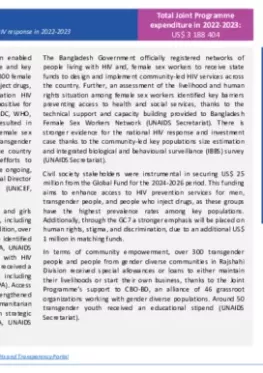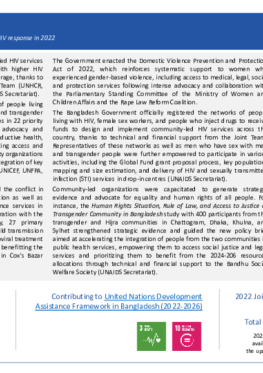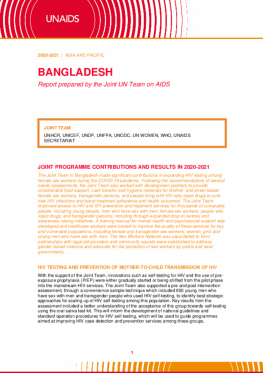|
Bangladesh
Rigorous advocacy, strategic support and coordination enabled Bangladesh to scale up HIV services among vulnerable and key populations. In the 2022-2023 biennium, more than 136 800 female sex workers, men who have sex with men, people who inject drugs, prisoners and transgender people accessed combination HIV prevention services and over 2000 people who tested positive for HIV were enrolled on treatment services (UNFPA, UNODC, WHO, UNAIDS Secretariat). Evidence-based advocacy has resulted in sustained access to HIV services for over 25% of female sex workers, 50% of men who have sex with men, 55% of transgender women, and 89% of people who inject drugs in the country (UNHCR, UNFPA, UNAIDS Secretariat). Additionally, efforts to integrate HIV and maternal and child health services are ongoing, with an interdepartmental committee led by the Additional Director General of Health Services overseeing the initiative (UNICEF, UNFPA, WHO, UNAIDS Secretariat).
In humanitarian settings, more than 15 000 women and girls accessed HIV, SRH and gender-based violence services, including protection from violence and exploitation (UNFPA). In addition, over 4000 people from key populations and HIV hotspots were identified following an HIV assessment in refugee camps (UNFPA, UNAIDS Secretariat). Hence, more than 1000 refugees living with HIV accessed antiretroviral treatment while women refugees received a Minimum Initial Service Package (MISP) for SRH, including prevention of vertical transmission of HIV services (UNFPA). Access to HIV services in humanitarian settings was further strengthened through integration of HIV services in the national humanitarian response and more equitable resource allocation with strategic support from the Joint Programme (UNCHR, UNFPA, UNAIDS Secretariat).





